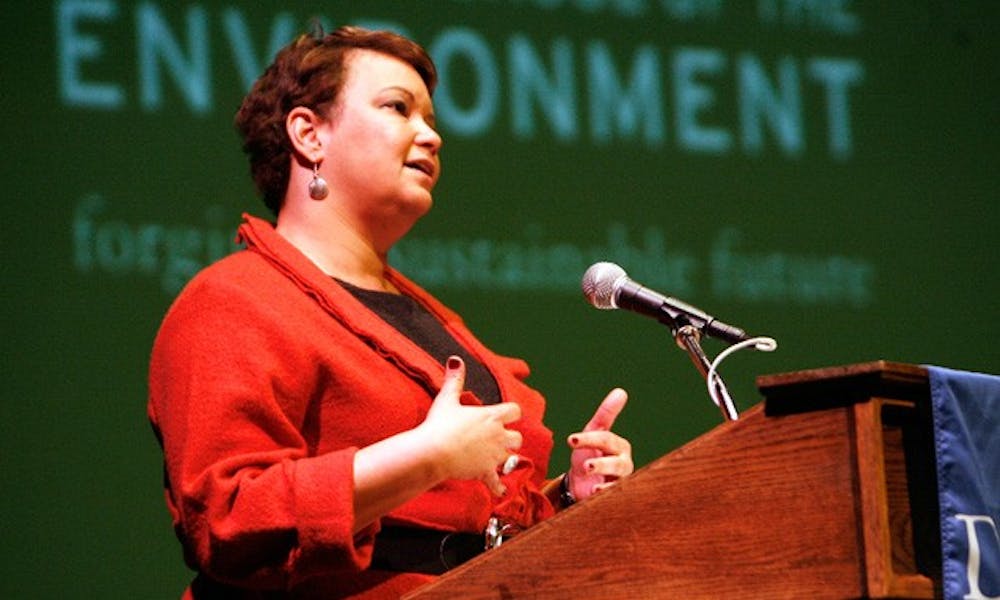A leader in environmental policy highlighted pressing concerns facing the Environmental Protection Agency Tuesday.
EPA Administrator Lisa Jackson addressed more than 500 people about environmental policies and challenges the EPA faces, particularly given the economic downturn and political climate. Jackson leads an 18,000-person department in an effort to protect and enhance the environment and public health. Deemed the 2011 Duke Environment and Society Lecture, Jackson’s talk was sponsored by the Nicholas School of the Environment and took place at Reynolds Industries Theater.
Jackson commended the Obama administration’s stance on environmental issues, discounting the notion that economic productivity and environmental health are mutually exclusive.
“President [Barack] Obama knows and has said the choice between the economy being healthy and the environment being healthy is a false choice,” Jackson said.
She noted that both economists and industry groups recognize that regulations are almost never the cause of economic problems or layoffs. The opposite is often true, as regulations encourage innovation and often result in a net increase in job creation, Jackson said.
Environmental health has traditionally been a bipartisan issue. The EPA, which was created by Republican former President Richard Nixon, saw some of its greatest advances under Republican administrations, Jackson said.
“People of all parties and opinions want swift action whenever they see a threat in their communities,” she said.
Jackson outlined some of the EPA’s recent works, including steps to reduce toxic air pollution and cross-state air pollution, as well as investments in water infrastructure and community cleanups. She noted that the Obama administration was the first to recognize the adverse effects of greenhouse gases.
Nicholas School Dean Bill Chameides introduced Jackson, adding that environmental health is deeply connected with human health. He also noted the EPA’s importance globally.
“The myth that the environment is an issue for greens… is just that—a myth,” Chameides said. “Anyone who questions the value of the EPA should spend a week in China or India.”
In an interview after the event, Jackson said many people do not remember what it was like before the establishment of the EPA, which may lead to uninformed criticism about the environment. Jackson said she wants to remind people about the environment’s impact on public health.
“There’s just no incentive in our system that’s built in to price pollution or deal with it or minimize it,” she said. “EPA has protection in its name—it’s not unlike a police force or a defensive unit of our government.”
Tim Profeta, director of the Nicholas Institute for Environmental Policy Solutions, said he is thrilled that Jackson came to Duke and commended her skills as the EPA administrator.
“We aren’t moving backwards on environmental protection, but we are moving backwards on political will,” Profeta said. “She’s the perfect administrator for this time—her ability to be pragmatic and to really roll with the punches in the middle of a political maelstrom has been essential for her to allow the agency to continue to function.”
Profeta said Jackson’s talk has wide-reaching effects beyond the University.
“[The talk] was a strong and forceful defense of the agency’s actions,” he said. “It’s not any surprise she came to this state and to this campus to make her voice heard, given the importance of the state in the politics of 2012.”
Justin Garland, a first-year Master of Environmental Management student at the Nicholas School, said he is impressed by Jackson’s talk.
“She was inspiring,” Garland said. “It was the first time I’d ever seen her, and I was surprised to come away feeling pumped up and excited about environmental work.”
Get The Chronicle straight to your inbox
Signup for our weekly newsletter. Cancel at any time.

